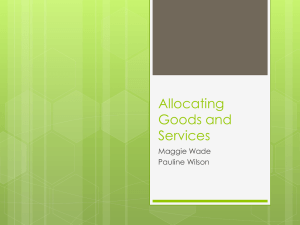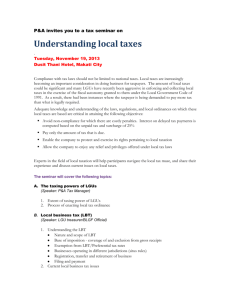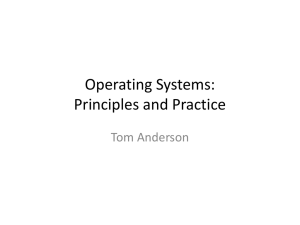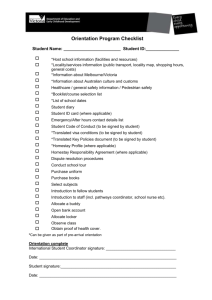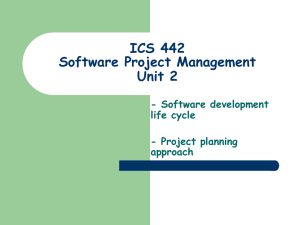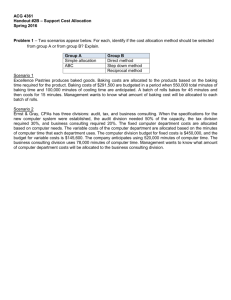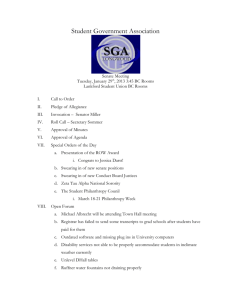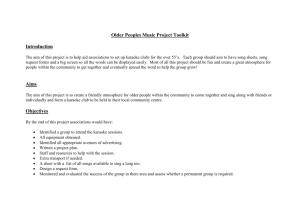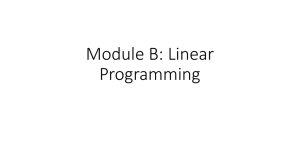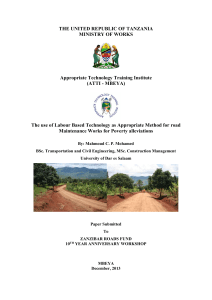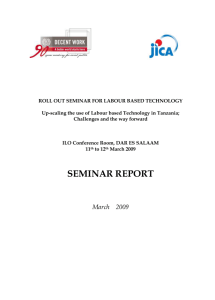Allocate and Monitor Progress and Quality of Work in Your
advertisement
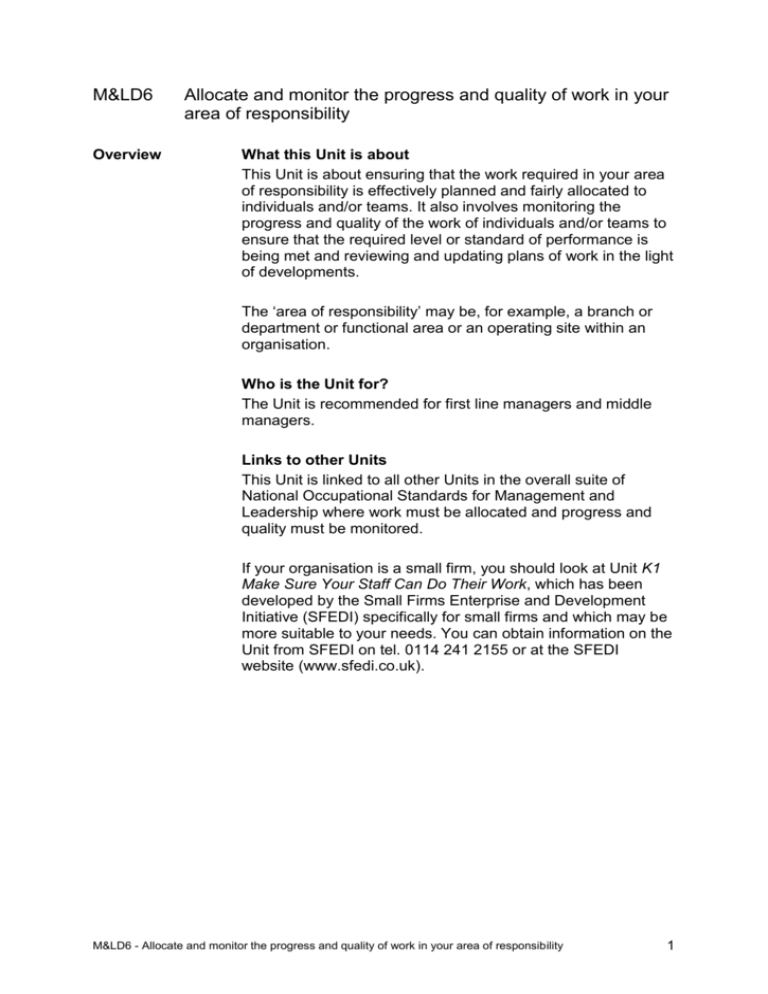
M&LD6 Overview Allocate and monitor the progress and quality of work in your area of responsibility What this Unit is about This Unit is about ensuring that the work required in your area of responsibility is effectively planned and fairly allocated to individuals and/or teams. It also involves monitoring the progress and quality of the work of individuals and/or teams to ensure that the required level or standard of performance is being met and reviewing and updating plans of work in the light of developments. The ‘area of responsibility’ may be, for example, a branch or department or functional area or an operating site within an organisation. Who is the Unit for? The Unit is recommended for first line managers and middle managers. Links to other Units This Unit is linked to all other Units in the overall suite of National Occupational Standards for Management and Leadership where work must be allocated and progress and quality must be monitored. If your organisation is a small firm, you should look at Unit K1 Make Sure Your Staff Can Do Their Work, which has been developed by the Small Firms Enterprise and Development Initiative (SFEDI) specifically for small firms and which may be more suitable to your needs. You can obtain information on the Unit from SFEDI on tel. 0114 241 2155 or at the SFEDI website (www.sfedi.co.uk). M&LD6 - Allocate and monitor the progress and quality of work in your area of responsibility 1 M&LD6 Skills Allocate and monitor the progress and quality of work in your area of responsibility Listed below are the main generic ‘skills’ that need to be applied in allocating and monitoring the progress and quality of work in your area of responsibility. These skills are explicit/implicit in the detailed content of the Unit and are listed here as additional information. Communicating Consulting Decision-making Delegating Information management Leadership Managing conflict Monitoring Motivating Planning Problem-solving Providing feedback Prioritising Reviewing Setting objectives Stress management Valuing and supporting others M&LD6 - Allocate and monitor the progress and quality of work in your area of responsibility 2 M&LD6 Allocate and monitor the progress and quality of work in your area of responsibility Performance Criteria You must be able to: 1 2 3 4 5 6 7 8 9 10 11 12 13 14 Confirm the work required in your area of responsibility with your manager and seek clarification, where necessary, on any outstanding points and issues. Plan how the work will be undertaken, seeking views from people in your area of responsibility, identifying any priorities or critical activities and making best use of the available resources. Ensure that work is allocated to individuals and/ or teams on a fair basis taking account of skills, knowledge and understanding, experience and workloads and the opportunity for development. Ensure that individuals and/or teams are briefed on allocated work, showing how it fits with the vision and objectives for the area and the overall organisation, and the standard or level of expected performance. Recognise and seek to find out about differences in expectations and working methods of any team members from a different country or culture and promote ways of working that take account of their expectations and maximise productivity. Encourage individuals and/or team members to ask questions, make suggestions and seek clarification in relation to allocated work. Monitor the progress and quality of the work of individuals and/or teams on a regular and fair basis against the standard or level of expected performance and provide prompt and constructive feedback. Support individuals and/or teams in identifying and dealing with problems and unforeseen events. Motivate individual and/or teams to complete the work they have been allocated and provide, where requested and where possible, any additional support and/or resources to help completion. Monitor your area for conflict, identifying the cause(s) when it occurs and dealing with it promptly and effectively. Identify unacceptable or poor performance, discuss the cause(s) and agree ways of improving performance with individuals and/or teams. Recognise successful completion of significant pieces of work or work activities by individuals and/or teams. Use information collected on the performance of individuals and/or teams in any formal appraisals of performance. Review and update plans of work for your area, clearly communicating any changes to those affected. M&LD6 - Allocate and monitor the progress and quality of work in your area of responsibility 3 M&LD6 Allocate and monitor the progress and quality of work in your area of responsibility Behaviours 1 You will exhibit the following behaviours: You recognise changes in circumstances promptly and adjust plans and activities accordingly. 2 You prioritise objectives and plan work to make best use of time and resources. 3 You make time available to support others. 4 You take personal responsibility for making things happen. 5 You show an awareness of your own values, motivations and emotions. 6 You show integrity, fairness and consistency in decisionmaking. 7 You clearly agree what is expected of others and hold them to account. 8 You seek to understand people’s needs and motivations. 9 You take pride in delivering high quality work. 10 You are vigilant for possible risks and hazards. 11 You encourage and support others to make the best use of their abilities. 12 You use a range of leadership styles appropriate to different people and situations. M&LD6 - Allocate and monitor the progress and quality of work in your area of responsibility 4 M&LD6 Allocate and monitor the progress and quality of work in your area of responsibility Knowledge and Understanding General knowledge and understanding 1 How to select and successfully apply different methods for communicating with people across an area of responsibility. 2 The importance of confirming/clarifying the work required in your area of responsibility with your manager and how to do this effectively. 3 How to identify and take due account of health and safety issues in the planning, allocation and monitoring of work. 4 How to produce a plan of work for your area of responsibility, including how to identify any priorities or critical activities and the available resources. 5 How to identify sustainable resources and ensure their effective use when planning the work for your area of responsibility. 6 The importance of seeking views from people working in your area and how to take account of their views in producing the plan of work. 7 The values, ethics, beliefs, faith, cultural conventions, perceptions and expectations of any team members from a different country or culture and how your own values, ethics, beliefs, faith, cultural conventions, perceptions, expectations, use of language, tone of voice and body language may appear to them. 8 Why it is important to allocate work to individuals and/or teams on a fair basis and how to do so effectively. 9 Why it is important that individuals and/or teams are briefed on allocated work and the standard or level of expected performance and how to do so effectively. You need to know and understand: 10 The importance of showing individuals and/or teams how their work fits with the vision and objectives of the area and those of the organisation. 11 Ways of encouraging individuals and/or teams to ask questions and/or seek clarification in relation to the work which they have been allocated. 12 Effective ways of regularly and fairly monitoring the progress and quality of work of individuals and/or teams against the standards or level of expected performance. 13 How to provide prompt and constructive feedback to individuals and/or teams. M&LD6 - Allocate and monitor the progress and quality of work in your area of responsibility 5 14 Why it is important to monitor your area for conflict and how to identify the cause(s) of conflict when it occurs and deal with it promptly and effectively. 15 How to take account of diversity and inclusion issues when supporting and encouraging individuals and/or teams to complete the work they have been allocated. 16 Why it is important to identify unacceptable or poor performance by individuals and/or teams and how to discuss the cause(s) and agree ways of improving performance with them. 17 The type of problems and unforeseen events that may occur and how to support individuals and/or teams in dealing with them. 18 The additional support and/or resources which individuals and/or teams might require to help them complete their work and how to assist in providing this. 19 How to select and successfully apply different methods for encouraging, motivating and supporting individuals and/or teams to complete the work they have been allocated and improve their performance, and for recognising their achievements. 20 How to log information on the ongoing performance of individuals and/or teams and use this information for formal performance appraisal purposes. 21 The importance of reviewing and updating plans of work for your area in the light of developments, how to reallocate work and resources and how to clearly communicate the changes to those affected. M&LD6 - Allocate and monitor the progress and quality of work in your area of responsibility 6 M&LD6 Allocate and monitor the progress and quality of work in your area of responsibility Knowledge and Understanding You need to know and understand: Industry/sector specific knowledge and understanding 1 Industry/sector requirements for the development or maintenance of knowledge, understanding and skills. 2 Industry/sector specific legislation, regulations, guidelines, codes of practice relating to carrying out work. M&LD6 - Allocate and monitor the progress and quality of work in your area of responsibility 7 M&LD6 Allocate and monitor the progress and quality of work in your area of responsibility Knowledge and Understanding You need to know and understand: Context specific knowledge and understanding 1 The individuals and/or teams in your area of responsibility. 2 The vision and objectives for your area of responsibility. 3 The vision and objectives of the overall organisation. 4 The work required in your area of responsibility. 5 The available resources for undertaking the required work. 6 The plan of work for your area of responsibility 7 The organisation’s written health and safety policy statement and associated information and requirements. 8 Your organisation’s policy and procedures in terms of personal development. 9 Organisational standards or level of expected performance. 10 Organisational policies and procedures for dealing with poor performance. 11 Organisational grievance and disciplinary policies and procedures. 12 Organisational performance appraisal systems. M&LD6 - Allocate and monitor the progress and quality of work in your area of responsibility 8 M&LD6 Allocate and monitor the progress and quality of work in your area of responsibility Evidence Requirements PC PC1 PC2 PC3 PC4 PC5 PC6 Evidence of Performance Criteria: possible examples of evidence Knowledge and Understanding Behaviours Records of work allocation to people and teams in your area of responsibility: notes or minutes of meetings with your manager regarding the work 1, 2, 4, 9,10 required from your team, and any priorities business, operational or production plans or schedules and other documents identifying the work required from your area of responsibility that 1, 2, 4, 7, 9 , 10 you have agreed, and any priorities you have identified detailed work plans or schedules, timetables and other plans for individuals’ 1, 2, 4, 7, 9, 10, and teams’ work activities, tasks, production targets or other ways of 11 defining workloads notes of meetings and briefings to discuss work plans or schedules, 1, 2, 3, 4, 5, 6, 7, timetables and allocate individual and team work activities, tasks, 8, 9, 10, 11, 12 production targets, etc personal statements (reflections on the process and reasoning behind work 1, 2, 3, 4, 5, 6, 8, planning and allocation, including work priorities, availability of resources, 9, 10, 11, 12, and the relative abilities and development needs of team members) witness statements (comments on the process of work planning and 3, 6, 7, 8 11, 12 allocation and perceptions of its fairness, appropriateness and clarity) M&LD6 - Allocate and monitor the progress and quality of work in your area of responsibility General Industry specific Context specific 1, 2, 3, 21 1, 2 1, 2, 3, 4, 5, 7 1, 2, 3, 21 1, 2 1, 2, 3, 4, 5, 7 3, 4, 5, 6, 7, 8, 21 1, 2 1, 2, 3, 4, 5, 6, 7 3, 4, 5, 6, 7, 8, 9, 10, 11 1, 2 1, 2, 3, 4, 5, 6, 7 2, 3, 4, 5, 6, 7, 8, 9, 10 1, 2 1, 2, 3, 4, 5, 6, 7 - - - 9 PC5 PC6 PC7 PC8 PC9 PC10 PC11 PC12 PC13 PC14 Records of the quality and quantity of the work of people and teams in your area of responsibility: records of the monitoring of work output/production for quality, consistency 12, 15, 16, 7, 9, 10 with specifications, etc (eg quality control sampling records, control charts, 17, 20, 21 etc) that you have collected or commissioned records of individual and team work output or production records, 15, 16, 17, 1, 7, 9, 10 18, 20, 21 production/operational reports that you have prepared, etc 1, 4, 6, 7, 9, 10, 17, 18, 19, records of any changes to work plans or schedules that you have initiated 12 20, 21 notes, reports, recommendations to managers or other records of problems or critical incidents and action you have taken in relation to supplied 14, 15, 16, materials; equipment, vehicles or facilities; product/service quality; health, 1, 4, 6, 6, 7, 9, 17, 18, 19, 10, 12 safety or security; customers; or team members’ work performance 20, 21 (including issues requiring disciplinary action, and training or coaching activity you have organised or undertaken) 12, 13, 14, notes, e-mails, memos or other records of formal or informal feedback or 3, 5, 6, 7, 8, 10, 15, 16, 17, 11, 12 performance appraisal of team members 18, 19, 20, 21 personal statement (reflections on your own role in dealing with problems or critical incidents affecting the team and its performance, and how you 12, 13, 14, 1, 3, 5, 6, 10, 11, 15, 16, 17, encourage the team and individual members to work to the best of their 12 18, 19, 20, 21 ability to achieve or exceed targets for quality and quantity of products or services) witness statements (comments on your own role in dealing with problems or critical incidents affecting the team and its performance, and how you 3, 6, 7, 8, 11, 12 encourage the team and individual members to work to the best of their ability to achieve or exceed targets for quality and quantity of products or services) M&LD6 - Allocate and monitor the progress and quality of work in your area of responsibility 1, 2 1, 2, 3, 4, 5, 6, 7, 9 1, 2 1, 2, 3, 4, 5, 6, 7, 9 1, 2 1, 2, 3, 4, 5, 6, 7, 9 1, 2 1, 2, 3, 4, 5, 6, 7, 8, 9, 10, 11, 12 1, 2 1, 4, 5, 6, 7, 8, 9, 10, 11, 12 1, 2 1, 2, 3, 4, 5, 6, 7, 8, 9, 10, 11, 12 - - 10
